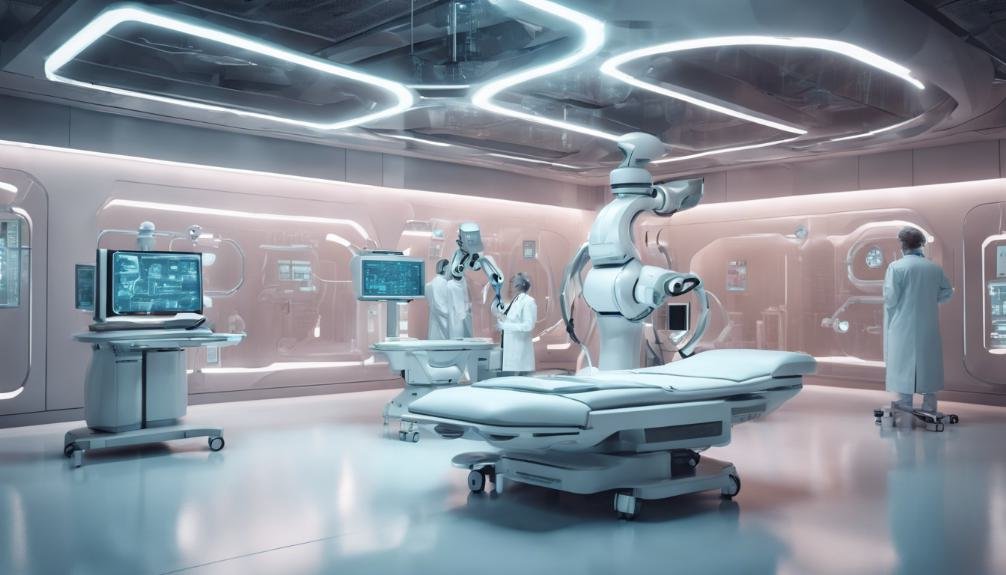AI in Preventive Medicine
In the domain of preventive medicine, AI stands as a beacon of innovation, reshaping the landscape of healthcare practices. Imagine a world where predictions are not just based on averages but tailored to your unique genetic blueprint and lifestyle choices. This revolutionary approach doesn't just stop at early detection; it extends to proactive interventions that could potentially alter the course of diseases before they manifest. The possibilities are vast, but the impact on healthcare is just beginning to unfold, promising a future where prevention truly becomes the cornerstone of well-being.
Key Takeaways
- AI analyzes vast health data for early detection.
- Personalized interventions based on individual characteristics.
- Utilizes advanced algorithms for disease prediction.
- Optimizes treatment plans for proactive care.
- Customizes healthcare for targeted preventive measures.
The Impact of AI on Healthcare
AI has revolutionized healthcare by enhancing diagnostic accuracy and treatment effectiveness through data analysis and pattern recognition. AI diagnostics, powered by machine learning algorithms, have enabled healthcare providers to analyze vast amounts of patient data efficiently. This has led to the development of personalized treatment plans tailored to individual patients' unique characteristics and medical histories.
AI diagnostics play an essential role in identifying patterns and trends in patient data that mightn't be immediately apparent to human healthcare providers. By analyzing this data, AI can help identify potential health issues at an early stage, allowing for prompt intervention and personalized treatment strategies.
This proactive approach to healthcare can lead to better outcomes for patients and more efficient use of healthcare resources.
Advantages of AI in Prevention
The application of artificial intelligence in preventive medicine offers a range of advantages that contribute to early detection and personalized intervention strategies. AI algorithms can analyze vast amounts of health data quickly and accurately, enabling healthcare providers to identify potential risks and diseases at an early stage. By leveraging machine learning, AI systems can recognize patterns and trends that may not be apparent to human professionals, leading to timely interventions and improved patient outcomes.
One significant advantage of AI in prevention is the ability to customize healthcare plans based on individual characteristics and risk factors. Through sophisticated data analysis, AI can create personalized interventions tailored to a person's unique health profile, optimizing the effectiveness of preventive measures. This personalized approach enhances the likelihood of early detection of health issues, allowing for proactive interventions that can prevent diseases from progressing or even occurring.
AI Applications in Disease Prediction
Utilizing advanced algorithms and data analytics, predictive models powered by artificial intelligence have revolutionized disease prediction in preventive medicine. AI applications excel in early detection by analyzing vast amounts of patient data to identify subtle patterns that may indicate the onset of diseases. By incorporating machine learning algorithms, these systems can assess an individual's risk of developing specific conditions based on factors such as genetic predisposition, lifestyle choices, and environmental influences.
In disease prediction, AI plays an essential role in risk assessment by providing personalized insights into an individual's likelihood of developing certain illnesses. These predictive models can help healthcare providers intervene proactively, offering tailored preventive measures to mitigate risks and improve patient outcomes.
Enhancing Patient Care With AI
Enhancing patient care through the integration of artificial intelligence involves optimizing treatment plans and streamlining healthcare processes for improved outcomes. AI enables remote monitoring of patients, allowing healthcare providers to track essential signs and health metrics in real-time from a distance.
This continuous monitoring can lead to early detection of health issues, prompt interventions, and personalized treatment adjustments tailored to individual patient needs.
Moreover, AI can analyze vast amounts of patient data to identify patterns and predict potential health risks, enabling proactive interventions before conditions worsen. By utilizing machine learning algorithms, healthcare professionals can offer personalized interventions that consider the unique characteristics of each patient, ultimately improving treatment efficacy and patient outcomes.
Future Trends in Preventive Medicine
AI technologies are shaping the future landscape of preventive medicine through innovative approaches that revolutionize healthcare practices. Technology advancements play an essential role in this transformation, with AI algorithms becoming increasingly sophisticated in analyzing vast amounts of data to identify patterns and predict potential health risks.
These advancements enable healthcare providers to offer more personalized prevention strategies tailored to individual patients, ultimately leading to more effective interventions and improved health outcomes.
Personalized prevention is a key trend in the future of preventive medicine, where AI plays a central role in customizing healthcare plans based on a person's unique genetic makeup, lifestyle factors, and medical history. By leveraging AI-driven algorithms, healthcare professionals can better predict disease risks, recommend targeted interventions, and empower individuals to take proactive steps towards maintaining their health and well-being.
As technology continues to advance, the integration of AI in preventive medicine will likely lead to more precise, efficient, and patient-centric healthcare solutions.
Conclusion
You simply can't ignore the incredible impact of AI in preventive medicine. From revolutionizing healthcare to enhancing patient care, the advantages of AI applications in disease prediction are nothing short of game-changing.
With personalized insights and proactive interventions, AI is paving the way for a healthier future where early detection and customized healthcare plans are the norm.
The future of preventive medicine is here, and it's powered by AI.







